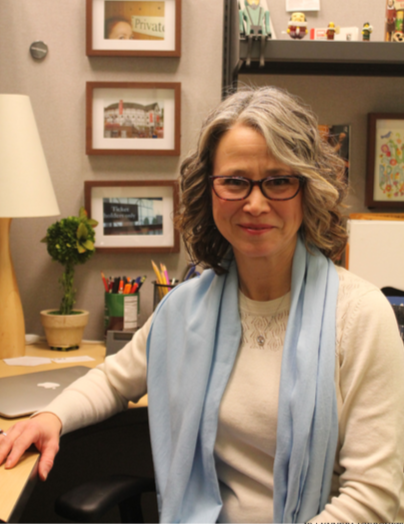By Anand Venigalla
Staff Writer
Valerie Clayman Pye, assistant professor of theater, has been part of the New Victory Theater’s 2018-19 LabWorks Artists program in order to develop new theatrical works for families. She is collaborating with Spellbound Theatre, which creates theatrical work for audiences ages 0-5, Pye is creating “Shakespeare’s Stars,” a project intended to connect multimedia and Shakespearean text to give young children a visually immersive experience with the playwright. “We introduce babies to classical music and Shakespeare’s heightened text has structure in it that is similar in terms of patterning and listening and things like that,” Pye said. “It’s going to be very exciting.”

“Shakespeare’s Stars” is a deconstruction of Shakespeare in an attempt to create a new work for younger audiences. “It’s not following a particular narrative, it’s using Shakespeare to create an immersive performance experience, Pye said. “Babies and very small children, they can’t follow a complex narrative like that, but they can hear, and the alliteration that Shakespeare uses, the wordplay, and the way in which he works with language is very appealing to the ear, and that appeals to children, and that’s what peaks their interest.”
Pye wants to find a way to make Shakespeare more relatable to audiences, and her “Shakespeare’s Stars” is a way she seeks to do that. “One of the big things in my own creative work is about helping to make Shakespeare more accessible for people and also how can we shake some of the stereotypes and some of the stigma surrounding Shakespeare, so that people can engage with the work in a way that perhaps they are more receptive to it,” she said. “Shakespeare can [seem] stuffy or rigid or old-fashioned and so on, but when we engage with it without our stereotypes, it’s actually not difficult to understand and it’s very relatable to us today.”
There will be another developmental residency in June for Pye’s “Shakespeare’s Stars” where the final touches will be made, after which Pye and the other creators will seek partners to produce a fully-staged production. “One of the things that has been wonderful about being in the LabWorks program is that we receive a lot of professional development support and so we are fortunate enough to become integrated into a community that includes people who produce, book, and represent works, and this often can be on an international scale.”
Pye is also working on a book, co-edited with Hillary Haft Bucs, associate professor of theater at Western New England University, called “Objectives Obstacles and Tactics in Practice: Perspectives on Activating the Actor,” intended to look at different approaches for teaching the work of theater practitioner Konstantin Stanislavski. Stanislavski developed his method, which emphasizes the actor’s use of his conscious will in order to experientially activate emotional experience and subconscious behavior.
“The objective, obstacles and tactics are the three main components of Stanislavski’s training method for acting, but there are lots of different ways of engaging that in the studio or classroom rehearsal and so on. And so this book brings together a variety of different perspectives of how the master acting teachers are engaging with these concepts in the classroom and in the studio,” Pye said. Pye noted that before Stanislavski came, there was no standardized method of training actors. “At least in the Western world, almost all of our actor training is based in some form on Stanislavski’s work.”
Pye explained that Stanislavski was “an absolute pioneer” and that her book will look at “what the best acting teachers are doing to help communicate Stanislavski’s teaching with actors and training.” The book will be published by Routledge in January 2020. Two other professors from Post, David Hugo and Maria Porter, will also contribute to the volume. Pye wrote a chapter for the volume called “Hunter/ Hunted: Experiential Learning and the Actor’s Craft.” Hugo will contribute which uses the concept of an obstacle to transform it in such a way that actors respond to it as in real time; this is applied to both non-musical and musical performance. Porter proposed a way to connect Stanislavski’s concepts with the ancient Greek dramatists.
Pye’s love for Shakespeare and theater stems from a very active engagement with theater early on. “I was really lucky in the third grade to have an amazing teacher who allowed us to do our assignments in different ways.”
After her undergraduate degree, she began work in children’s theatre with Theatreworks/USA. She received an MFA in acting from Brooklyn College, an MFA in staging Shakespeare and a Ph.D. in performance practice, both degrees obtained from the University of Exeter in England.
“I went to England and I did a second MFA degree in staging Shakespeare, and then I realized I was really interested in what was happening at the Globe, the replica of Shakespeare’s theater in London. When I experienced Shakespeare in that space, it felt completely alive and different from how I had experienced it in other places.” For her Ph.D., she “had a grant from the British government to develop an actor training methodology based on the conditions at Shakespeare’s Globe [and] the relationship between the space for which he wrote and the text.” That methodology became the groundwork for “Unearthing Shakespeare: Embodied Performance and the Globe,” her first book, and for her work at Post where she teaches her methodology to theatre students. She has also served as adviser to the Post Theatre Company’s production of “The Comedy of Errors.”
She doesn’t have one favorite Shakespearean play. “There are different plays that do different things,” she said.“There are plays that teach us about leadership, that remind us how to pay attention to the fact that we all in our differences deserve respect and dignity and to be treated equally. I think that there are plays that help us understand the complications of what love is, and what identity is, and I think that there are plays that kind of highlight the horrible things that human beings are capable of doing to one another, and I think that they all have really important places or positions for us,” she said. “Measure for Measure,” for example, has “one hundred percent” relevance in the age of MeToo. And “The Merchant of Venice” and “Othello” are “about human rights and stereotypes and the dangers of inequality and racism.” Likewise, “The Comedy of Errors” shows “how there’s a time and a place for pure fun as well as looking seriously at what we could be doing better.”
Pye advises aspiring theater actors, directors, and others to become more engaged in the world. Her advice “is to study human behavior, to observe the world around you, to be very curious about how we tell stories and how relationships unfold between people, and to understand how we can learn from the history of how theater has helped people understand the world around them.”
Pye is teaching Intermediate Acting II, as well as Advanced Voice and Speech I.



Be First to Comment